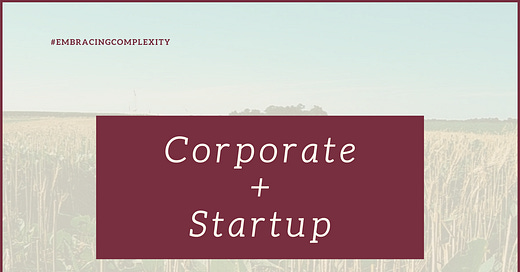Yes, corporate. And, startup.
The balance of two segments in an industry—and forces in the world—is precisely what makes the other valuable.
I’ll never forget the summer I fell in love with agtech startup culture. I moved to a new state to work with people I barely knew in a segment of the industry I had only recently met; it was intimidating, and that’s part of why I loved it.
Growing up, I was surrounded by a culture of curiosity. The combination of farm life, homeschooling, and my family’s love for learning meant I spent much of my free time asking questions and finding answers. I thrived in places where I could freely experience knowledge, not simply memorize and recite it. I didn’t connect the dots from this childhood proclivity to the world of startups and technology in agriculture. That is, until I met a founder and CEO of a company centered in this innovative space. An atypical hiring process (shaking hands at a conference, exchanging a few LinkedIn messages, and a few hours on the phone was all it took) led me to find myself in a role I didn’t even know existed.
My first few days on the job were full of learning the language of soil health in relation to data analytics, driving across Washington County, Iowa to pull soil samples and visit farmers as they cared for product trial plots, and meeting my coworkers—most of whom lived in different parts of the country. While the mild chaos overwhelmed me at first, I found my stride as I realized this was a space almost created precisely for me: chaotic enough to be a challenge, but meaningful enough to be worthwhile. I fell into the role of doing whatever needed to be done but others didn’t have the time to do it, and creating better systems to outlast my short stint as an intern.
By the time I left in August, I hadn’t simply built meaningful relationships and had the chance to add value to meaningful work; I found a corner of agriculture that excited me. I spent hours reading books and watching online seminars about agtech and entrepreneurship and innovation. I became so immersed in it I began to become cynical about larger, more established companies in the industry. I would question why there was so much bureaucracy, why timelines were so slow, and why people would find value in corporate agriculture.
Have you ever found yourself so invested in one aspect of life—it can be anything, from careers to music genres to a region of the country you love—you end up downplaying others to build up your own? It’s easy to do. We have this natural human tendency to not only want to speak highly of what we love, but we want to widen the gap even further from the thing we don’t love. Sometimes, we do this out of jealousy, because deep down we actually wish we were part of the “other” group but if we pretend we hate it people won’t be able to see. Other times, we’re not even consciously doing it. It just happens because we feel so strongly about what we love. I’m learning just how dangerous this can be.
Over the last 8 months or so, I’ve had the chance to interact with a number of influential individuals in larger agriculture corporations. Several in particular have left me with wisdom and insight I was too blind to see before. One, as I shared with him my desire to work with startups for my entire career, challenged me to consider the value of learning from the resources of more established companies. He had a good point. Another has given me the perspective (which should have been easy for me to see, but my blinders prevented me from seeing it) that, even if I do find myself continuing down the startup path, most new companies’ ultimate goal is to be acquired by the large companies… so, why not learn about the other side of the acquisition, too?
This is where I realized, independent of my own career choices, just how critical it is to value the balance of two (or more) forces in the world: often, one cannot exist without the other. If all companies were startups, there wouldn’t be enough capital to invest or companies to acquire the valuable technology created by the young, innovative companies. If the big players in the industry were the only players, they would struggle to innovate fast enough to provide for a changing world.
It’s true in agriculture, it’s true in business in general, and I believe it’s true in other areas of life, too. In politics, we often spin our wheels complaining about the other side when it’s the balance which allows us to hold each other accountable. In school, we sometimes make fun of the band kids for being nerdy and the sports kids for being jocks, but we can’t all do the same thing, we don’t all have the same talents, and let’s be real, even the football fans know football games would be pretty boring without the marching band at halftime. It’s so valuable to find what you love; the moment you begin tearing down what others’ love because it isn’t what you love is the moment it turns from fulfilling to degrading.
Yes, I will always have a bent towards innovation in startups, but it’s my hope I can learn to better appreciate all aspects of business in agriculture. Yes, find your niche, but never let your love for your niche turn into disdain for someone else’s. When it comes down to it, you have a purpose on this earth, and I have a purpose, and I think we’re both glad it’s not the same one.
What’s your niche? How can you support others in their purpose, too? Drop your thoughts in the comments below or tag @miriamrosah on Twitter or Instagram. I’d love to learn from you.




